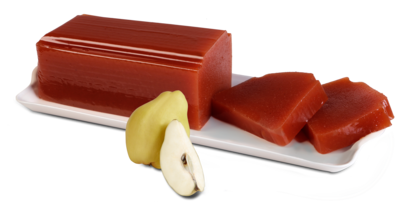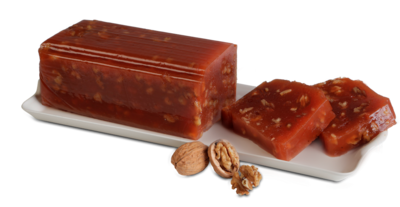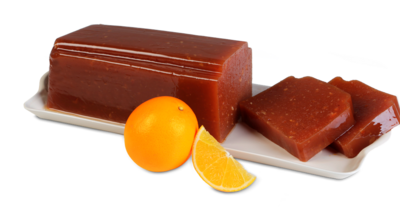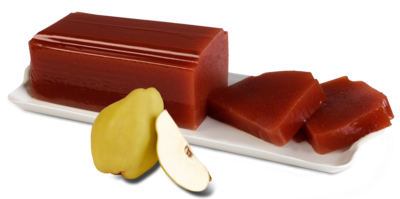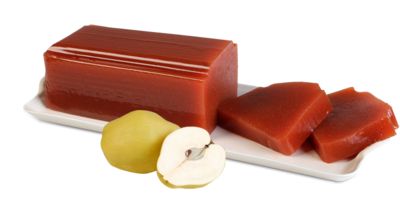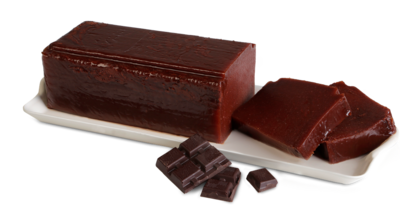The history of quince
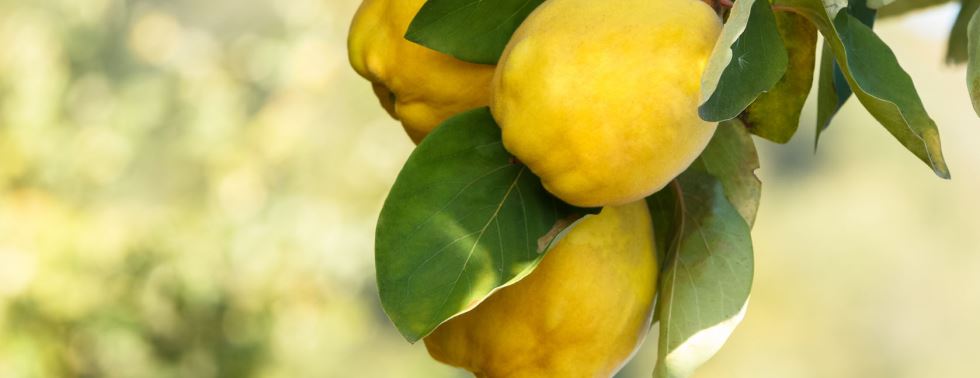
The origin of the Spanish word for our membrillo quince comes from the name for the quince tree’s branches. When the branches are new, they are tender, flexible, and highly resilient, just like “mimbre” (wicker). “Membrillo” is the diminutive of “mimbre” .
Quince has always been prized for its medicinal properties, and is known to have been cultivated in ancient Babylon.
The Greeks were familiar a common variety of quince grown in Crete, in the city of Cydon, hence its scientific name of Cydonia oblonga . In Greece, quince was sacred to Aphrodite, the goddess of love and fertility. According to various sources, including Plutarch, Greek brides chewed on a piece of quince to get sweet-smelling breath before entering the bridal chamber.
The Romans continued the Greek tradition, representing the goddess Venus holding a quince in her right hand. They also gave quince to the couple to dine on as a symbol of good luck and fertility.
After the discovery of methods of preserving foods in sugar in the fourth century AD, Roman agriculturist and writer Palladius worked on the idea of baking quince honey strips, which reduced its volume by half and resulted in a spread. As early as the seventh century, recipes for jellies prepared with quince juice and honey began to appear.
In the Middle Ages, quince was also highly valued. It was often served at tables of monarchs and aristocrats, who ate it at banquets and luxury culinary events as a sign of their greatness.
The alchemist and confectioner Nostradamus left several written recipes for quince compote in his book. His writings explained that chefs who peeled the fruit before cooking it did not know what they were doing, as the skin actually accentuates the smell of the fruit.
The Arabs also valued this fruit and recognized its many medicinal virtues.
The quince fruit has long been home grown and cooked in rural environments, thanks to its long shelf life, extensive culinary applications, and high energy content.
Today, artisanal creators have kept the traditions and craftsmanship of the past alive, and provide the consumer with a product identical to the one dating back to antiquity. Great chefs have incorporated this unique fruit into their recipes, giving it the rightful place it deserves in the culinary world.
Quince has always been prized for its medicinal properties, and is known to have been cultivated in ancient Babylon.
The Greeks were familiar a common variety of quince grown in Crete, in the city of Cydon, hence its scientific name of Cydonia oblonga . In Greece, quince was sacred to Aphrodite, the goddess of love and fertility. According to various sources, including Plutarch, Greek brides chewed on a piece of quince to get sweet-smelling breath before entering the bridal chamber.
The Romans continued the Greek tradition, representing the goddess Venus holding a quince in her right hand. They also gave quince to the couple to dine on as a symbol of good luck and fertility.
After the discovery of methods of preserving foods in sugar in the fourth century AD, Roman agriculturist and writer Palladius worked on the idea of baking quince honey strips, which reduced its volume by half and resulted in a spread. As early as the seventh century, recipes for jellies prepared with quince juice and honey began to appear.
In the Middle Ages, quince was also highly valued. It was often served at tables of monarchs and aristocrats, who ate it at banquets and luxury culinary events as a sign of their greatness.
The alchemist and confectioner Nostradamus left several written recipes for quince compote in his book. His writings explained that chefs who peeled the fruit before cooking it did not know what they were doing, as the skin actually accentuates the smell of the fruit.
The Arabs also valued this fruit and recognized its many medicinal virtues.
The quince fruit has long been home grown and cooked in rural environments, thanks to its long shelf life, extensive culinary applications, and high energy content.
Today, artisanal creators have kept the traditions and craftsmanship of the past alive, and provide the consumer with a product identical to the one dating back to antiquity. Great chefs have incorporated this unique fruit into their recipes, giving it the rightful place it deserves in the culinary world.
Contact
For more information about our products or if you would like to consult us about a specific
issue, you may contact us by:
Contact
Telephone
(+34) 938 994 821
(+34) 938 994 821
Email
valliser@valliser.com
valliser@valliser.com
Where are we?
C/ Pujada de Bellver, 20 bis ,
08735 - Vilobí del Penedès
Barcelona
C/ Pujada de Bellver, 20 bis ,
08735 - Vilobí del Penedès
Barcelona
Thank you for contacting Valliser .
Your message has been sent. We will reply as soon as possible.
Your message has been sent. We will reply as soon as possible.


